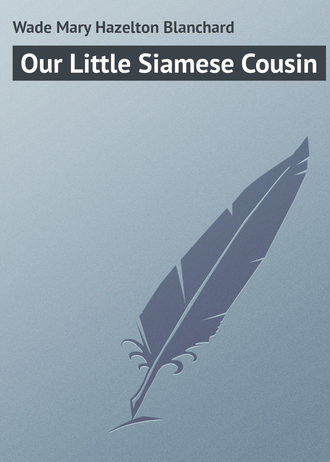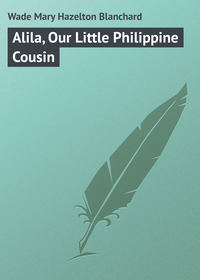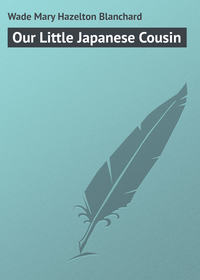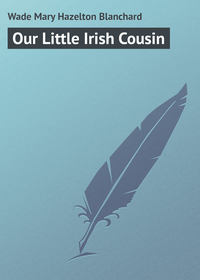 полная версия
полная версияOur Little Siamese Cousin
"After we come out, let's have a game of hide-and-seek with those children," said Chin.
He pointed to some boys and girls playing among the trees and statues, and having a merry time.
As the children turned toward the buildings, they passed under some trees from whose branches hung pieces of wood, stone, and porcelain.
"People hung those offerings there because they are going to build a home," said Chin. "Or perhaps they are just married, and are beginning housekeeping."
"I know that, of course," answered Chie Lo.
As the boy and girl entered the temple, they stopped at the cistern of water near the door. Wooden dippers were handed to them, which they were to fill. They must wash their hands and rinse their mouths before they dared to draw near the statue of the holy Buddha or knelt in prayer. They must do it as a symbol that their tongues were pure.
After this was done, they threw their coins into a large money-box, and passed into the main part of the temple. There were no seats, but the worshippers sat together on the floor in little circles.
The altar was beautifully carved, and built up in the shape of a pyramid. Many offerings could be seen lying upon it. There were lovely flowers, luscious fruits, and piles of snow-white rice. These had all been brought here to-day by those who had come to worship and to pray. Behind the altar were high panels on which the life of Buddha was pictured.
Chin and his sister loved to study these pictures and dream of the Holy One in whom they believed.
Their mother had taught them that long ago a great being lived in this world. He was born in a palace, and was the son of a king. He knew only joy and comfort until one day, when he met a poor old man. His heart went out in pity to him, and he said to himself:
"I will not live in comfort any longer if others in the world suffer and are poor."
He went out from the palace and spent the rest of his life teaching and giving help.
Chin and his sister did not stop to look at the pictures now. They joined one of the groups sitting cross-legged upon the floor. A moment afterward their heads were bent, and their small hands were pressed together in prayer.
From time to time, one of the worshippers rose and stepped over to a big bronze bell, and rung it violently. This was because he felt that his prayers were not heard, and he wished to call attention.
Listen! A priest is reading from a palm-leaf book; and now he chants a prayer with his face hidden behind a big fan. He keeps time by striking a bell, or beating on a block of wood. The people rise upon their knees and bow to the ground as he chants. There is no music in the strange service.
As Chin got up to go away, he turned to Chie Lo and whispered:
"I love to look at the bronze elephants carved on the walls. They look very wise and strong. They are the symbols of the Buddha, who taught men to be patient and faithful."
"I always love to look at the flag of our country, too," answered Chie Lo. "The great white elephant pictured on the red cloth makes me think of the same thing."
"I believe I shall like it when I am old enough to come here to study with the priests," her brother went on. "I shall like to serve them, and they will teach me many good things. But I don't believe I shall ever be a priest myself."
It is the custom of Chin's country for all the boys to live awhile in the wats, as soon as they are old enough to have their heads shaved. They help the priests in the temples, and serve them in different ways. They are also taught to write and cipher. After they have stayed a certain time, they may choose for themselves what they will do. They may study to become priests themselves, or they may go back to their homes and choose some kind of work.
As for Chie Lo, what would she do when Chin went away from home? Her parents were too poor to send her to a school for girls. She would sell fruits and vegetables in her little boat until she was old enough to get married.
Poor little child! She turned to her brother as they left the temple, and said:
"I wish, Chin, that I could go to school and be able to recite poems and stories."
For in that strange country of Siam, few girls learn either to read or write, even if they are able to go to school.
Their teacher recites some lines and the pupils repeat them after him until the whole piece is learned. Then another is taken up in the same way, and still another. But every child must be sure of one thing: she must know an odd number of pieces when she has finished.
You remember the Siamese seem to be afraid of even numbers in anything whatsoever.
As for geography, or history, or any other pleasant study, such as you have, very few of the children of that country have even heard of them. I doubt if Chin and his sister know anything about the great, beautiful country on the other side of the world, where their American cousins are living.
But Siam is slowly changing, and, as I have already said, the king who now rules is wiser than those before him. He will help his people to become wiser, too.
As the children went on their way home, they fell to talking about their ruler. They spoke of him as "The Lord of the Celestial Elephant," and other queer titles.
"He worships in the temple of the Emerald Buddha," Chin told his sister. He had heard others describe the beautiful place.
"It seems as though I could almost see it," the boy declared. "It must be wonderful. Just think, Chie Lo, the floor is paved with bricks of brass, and the walls are covered with paintings. The altar is several times as high as our house. It is loaded with images from the bottom to the very top. They are covered with gold, except the Emerald Buddha itself, which is above all the rest.
"Its hair is made of solid gold, in which are diamonds and rubies and many other kinds of precious gems. I wish I could look at it just once, although it is so high up, a person can hardly see it as he stands on the floor."
"Mother said nobody made that statue," said Chie Lo when her brother had finished. "It was a miracle, and suddenly appeared in the world after a visit of Buddha."
"Mother and father know a great deal," replied Chin. "When we get home to-night, let's ask them to tell us the story of how gold and silver came to be in the world."
CHAPTER VIII
THE LEGEND OF THE PEACE-OFFERING
It was a beautiful moonlight night. The stars shone faintly in the clear sky.
"They do not look as though they felt as happy as usual," said Chin to Chie Lo, who sat beside him on the platform of the house. "They are jealous because the moon is hiding them by her brightness. Here comes father; now we can ask him."
"Father, will you tell us the story of Rosy Dawn?" said his son, as the boat drew up beside the platform and the man jumped out.
"As soon as I fill my betel-box, Chin," was the answer.
Five minutes afterward, the family gathered around the story-teller by the side of the quiet river.
"Once upon a time," he began, "Father Sun was much nearer the earth than he is now. He was ever ready to advise his younger brother, the king of our country, and would even order his officers, the stars, to do anything which might help this blessed land.
"It was long, long ago that all this happened. Everything was so different then from what it is now, that there was no sickness nor sorrow in the land. People lived to be hundreds of years old. Why, my children, the King of Siam himself was looked upon as a very young man, although he was at least one hundred and sixty years old.
"His father, the old king, was still alive, but had grown tired of ruling after two hundred years of such work. He had given it into his son's hands, and now took his ease.
"His only daughter, a beautiful maiden named Rosy Dawn, spent most of her time in cheering him and making his life happy. No one had ever looked upon her sweet face except her own family. She was as good and simple as she was beautiful. Her days must have passed very quietly, for her only amusements were singing her old father to sleep and wandering alone through the fields and woods.
"A sad thing happened about this time. The naughty stars grew jealous of their lord, the Sun. They did not like it because he chose to keep awake all the time, and was having such pleasure with the earth and its people that he never thought of sleeping.
"Day and night, summer and winter, he gave his bright light to the world; he seemed afraid that something ill might happen to his young brother the king, if he left him for a moment. Of course, the stars had no chance of showing their own beauty, and this was what put them out of temper. They said to each other:
"'Our lord has some reason for not sleeping which we do not understand. We will watch him, and set a snare for him.'
"So, when they themselves should have been sound asleep, for it was now bright noonday, they set to watch the jolly, laughing Sun.
"It happened at this very time that Rosy Dawn left her sleeping father's side and went out for a frolic in the woods. She picked the wild flowers and made them into wreaths; she softly sang sweet songs to herself, and she watched the squirrels and lizards as they played about among the trees.
"All at once she spied a beautiful butterfly move past her. It was larger and more brilliant than any she had ever seen before. She said to herself:
"'I must have the lovely creature,' and ran after it.
"On flitted the butterfly, faster and faster; on sped Rosy Dawn after it. But it was in vain. For after a long chase, and just as she thought she was about to succeed, the butterfly rose up into the air, higher and higher above her head.
"Now the fair maiden turned back toward home, and for the first time she thought of how tired she was. Her dainty feet fairly ached from the long chase, and she stopped at a refreshing brook to bathe.
"Just at this moment, the Sun's glorious chariot appeared over the hilltop. The warm light fell upon Rosy Dawn and made her feel quiet and restful. At the same time the Sun himself looked down upon the beautiful maiden and he fell in love with her then and there.
"When she had finished her bath, Rosy Dawn left the stream and entered a shady cavern near by, where she might rest.
"The Sun's great chariot flew through the heavens as his noble steeds were spurred onward. It seemed as though he could not wait a moment longer before he should come to the charming girl he had just seen.
"You ask me if he won Rosy Dawn's love in return. Ah, yes! And, sad to say, trouble followed after.
"You remember that the jealous stars were watching their lord's movements. After a while they discovered that he was making love to Rosy Dawn. They followed him one day when the two were fondly talking together in their favourite resting-place, the cavern.
"Alas! the chariot was outside. The wicked stars seized it and carried it off, and the frightened steeds ran away. They did not turn their heads until they had reached home.
"The angry stars did not stop here. They raised a great shout against their ruler, and declared they would be his subjects no longer. The poor old Sun began to tremble, and shed tears of gold.
"The mountains were truly sorry for him. They opened up a passageway through which he might return home. They promised him that he might drive through this cavern every day and be perfectly safe. Again he wept, and more plentifully still.
"At last he started on his way homeward, and, as he journeyed along, his tears fell and formed pools of gold. Those pools are now the gold mines of Siam.
"It took twelve hours for Old Sol to reach home, after which he went out every day; but he came back regularly at night-time by way of the cavern that the mountains had given him.
"After this poor Rosy Dawn wandered sadly about through the caves and mountains. She, too, wept, and her tears were very plentiful. Wherever they fell you will now find the silver mines of our country.
"But you must not think her joy was at an end. The wicked stars at last made an agreement with their lord, the Sun. They said he might live with Rosy Dawn for one-half the month, if they were allowed to look at her beautiful face for the other half.
"Ever since that time the Sun meets Rosy Dawn at the mouth of the cave where he first saw her, and carries her home to stay with him for two weeks out of each month."
"You didn't mention one important thing," said Chin, as his father ended the story. "You forgot to say that the stars insisted on the Sun's never kissing Rosy Dawn when any one can see him. We know hers is another name for the Moon; and the Sun breaks his agreement with the stars once in a great while, whenever there is an eclipse."
"Yes, that is why the people beat drums and fire off guns at such times," said the children's mother. "It is to shame the Sun, and to make him stop such conduct at once. Of course it takes some time for the sounds to reach him, but as soon as he hears, he seems to be ashamed, for the eclipse soon passes by."
"When I was a boy, I went on a pilgrimage to the very cavern where the Sun first met Rosy Dawn," said the father. "I was careful to carry both a silver coin and a gold one. When we reached the place, I threw the money into the cavern. Every one else did likewise. We offered these coins in hopes of making merit for ourselves."
CHAPTER IX.
QUEER SIGHTS
"I am going to the city to-day to buy a new waist-cloth," said Chin's father one morning. "Chin, you may go with me, if you like."
A few moments afterward the two were paddling down the river past the temples and palaces which lined the shore.
Besides the homes of the rich, surrounded by stately palm-trees and beautiful gardens, there were other houses belonging to poorer people. These last were built close to the river's edge, but were raised high up above the water, on posts.
This was a wise thing to do for several reasons. In the first place, the river would rise after the fall rains began, and the houses might float away, – or, at least, the people inside would be flooded, unless they had been careful to build high enough to prepare for such times.
The fine houses were of brick or wood, but the poorer ones were much like Chin's house-boat, woven of bamboo and thatched with leaves.
The boy and his father soon left the main part of the river and turned into one of the canals. They were now in a part of the city where a good deal of business was going on. They left the boat, after fastening it to the bank, and walked along through the narrow street.
The fronts of the houses here were all open and everything within could be plainly seen. In this one was a big counter, almost filling the room, and the merchant himself sat cross-legged upon it with his goods around him.
There was a bakery where the cakes and bread were made and baked in sight of everyone who passed. Chin liked to stop and look at the various workmen. There was much to see and learn. The metal-workers were pounding and hammering away, and, as the boy watched them, he could see bracelets and anklets shaped, and sheets of copper formed into various dishes.
In many places the families of the storekeepers lived in the one room that was both store and dwelling, but they did not seem to be troubled when they noticed Chin's black eyes following them.
In one store a hammock hung from the ceiling and a baby was swinging there. What did he care if he was brought up on the street, as one might say? Care! He seemed to think the coming and going of so many people was meant all for him, and he laughed and crowed at each new face.
"Do look, father," said Chin, as they passed a barber's shop. "There is a Chinaman having his head and eyebrows shaved. He won't be satisfied until his eyelashes have been pulled out. Other people have strange fashions, don't they?"
His father smiled. "Yes, Chin, we are all different from each other in this world. But I know one thing in which we are like the Chinese. We love kites, don't we?"
Chin's eyes sparkled. "Yes, indeed, father. There is a kite store, now. Let us go in and look around. The kites there are beautiful."
It is no wonder Chin longed to stop. All sorts of kites were there to tempt the passer-by. They were in the shapes of flowers and boats, dragons and elephants, and I can't tell how many other odd or lovely patterns. Chin's father was as much interested as his son, and a half-hour was spent before they finally decided on buying a kite in the form of a butterfly.
"We will have great sport in flying it this afternoon," said Chin. "Chie Lo must enjoy it with us."
He had finished speaking when he caught sight of a procession coming in that direction. A moment before there had been so many children, dogs, and cats in the street they seemed to block the way of everything else; but now the children quickly turned aside and ran into the doorways.
As the procession drew near, a great shouting and beating of drums could be heard.
"Father, look quickly," said Chin. "The men are carrying a statue of Buddha on a litter. Isn't it beautiful? It is all covered with gilt. I wonder where they will carry it. Oh, now I see; they have stopped at that open place and are going to have a play. There are the actors themselves."
"Some rich man is doing this," said Chin's father. "He has probably hired the actors, and the show will be free to all. He is making merit for himself, without doubt. We will join the crowd."
By this time the gilded statue had been set up on a sort of throne, and sticks of incense were lighted and placed on the rough altar in front of it.
The strangest part came now, for the actors began to put on their queer costumes right before the people who had gathered around the show. Then came the play.
There was neither stage nor curtain; nor was there any scenery, except that of the place itself. But Chin and his father enjoyed it as well as the other onlookers. They laughed and looked sad, in turn, and seemed to forget that it was only a play, and not real life, that was pictured before them.
When the play was over, Chin's father said:
"We must go back to the stores, for I have not bought my waist-cloth yet."
The place they soon entered was different from any dry-goods store you ever saw. The room was fitted with pigeonholes, in each of which was folded a strip of cloth one yard wide, and three yards long. Some of these pa-nungs, or waist-cloths, were of silk, and others of cotton. Some were striped, and others figured. They form, as you know, the principal part of the dress of both men and women in Siam.
After Chin's father had looked at a number of the cotton waist-cloths, he finally decided on one that was gaily striped. It was of no use for him to examine anything made of silk. It would cost more than the poor man could afford.
"Now, for the tailor's," he said. "I must buy thread and needles."
A few steps brought them to the tiny shop where the tailor sat, working busily, but on the watch for customers at the same time. He held the cloth on which he was sewing between his toes! That did not seem strange to Chin. He had often watched carpenters use their toes to hold boards in place. As to himself, his own toes were put to every possible use, so that you would almost call him four-handed.
As his feet were always bare, why shouldn't he make them useful in other ways than walking and running, swimming and playing games? There was no reason at all.
"I'm getting hungry, and we are a good ways from home, father. I wish we could buy some cakes."
Chin looked longingly at a stand under a stone archway where two men stood in front of a movable furnace. Square griddles were on the furnace, and the men were busily baking cakes. Each one was made in the shape of the figure 8. Curlicue cakes, they were called.
A crowd of boys was standing as near to the furnace as possible, watching the men. Some were buying the cakes as they came from the hot griddle; others had no money and could only look on.
Each of the bakers held in his hand a terra-cotta bottle with a small hole in the end. He kept the bottle horizontal while he filled it with the batter. When the griddle was hot enough, he held the bottle upright for a moment with his finger over the hole, then, taking his finger away, he passed it quickly over the griddle with the motion you would use in making the figure 8. A minute afterward, a delicious curlicue cake was ready for a customer.
"You may treat yourself here, Chin," said his father, "while I go to the betel stand yonder, to get my box filled."
It was now noon-time, and the sun was very hot. The street, which had been crowded all the morning, was nearly empty. Almost every one in the city, except the poorer people, was now taking a midday nap in the shadow of some tree or veranda.
"We must go home, Chin, for I am warm and tired," said his father, but he smiled pleasantly, for he had enjoyed the morning as much as his son.
On their way to the boat they passed some jugglers treading fire and climbing a ladder of sharp knives with their bare feet. At most times, a large crowd would have been gathered around them, but there were few people now. It was too hot, and even Chin was glad to leave the city street and get into his little boat once more.
Perhaps you wonder if there are no carriages in this strange city of the East. There are not many, since, as you remember, most of the travelling is done on the water. But once in a while one sees a queer sort of vehicle called a jinrikisha.
It is much like an open buggy on two wheels and is drawn by men. It is more common in the land of Chin's Japanese cousins, however, than in his country.
Then, again, if any of Chin's people are in a great hurry (but that very seldom happens), they may hire gharries, which are very light and have canvas tops. These are drawn by small horses brought from China.
"The gharries are strange things," thinks Chin's father; "the idea of using them must have been given by those queer white people, who do not seem to enjoy life as we Siamese do. They move so much faster, and are not satisfied to do things in the quiet, happy way of my countrymen."
CHAPTER X.
THE QUEEN'S CITY
"I have had a lovely time to-day, too," said Chie Lo, when Chin had told her of his walk through the city.
"I sold my fruit in an hour or two, and then Pome Yik and I went off in my canoe to have a good time by ourselves."
Chin laughed when his sister mentioned Pome Yik. She was a curly-headed playmate of Chie Lo's. The Siamese think that straight, wiry hair is the only beautiful kind in the world, and make fun of any one whose hair is even wavy. So the little girl spoken of came to have the nickname Pome Yik, which means curly-head.
Her real name was almost forgotten, but, poor child, she didn't enjoy hearing herself called Pome Yik any more than if it had been "double-toe" or "hunchback," or the name given to any kind of deformed person by the people of her country.
"We went several miles before we stopped," Chie Lo went on. "We passed that big rice plantation, Chin, where you often go on errands for father. Then we came to a field flooded with water and covered with lotus blossoms. They had been raised for market and the people were busy gathering them.
"See, Chin, they gave me these to bring home. Aren't they beautiful?"
Chie Lo held up a bunch of the great, delicate lilies for her brother to admire. Their hearts were golden; the petals, which were of a faint pink near the centre, were of a deep, bright red toward the tips.
The flower had a great meaning to these children of Siam. It told the story of life, and was sacred to the Buddha, who was often pictured sitting on the lotus. Why should it mean so much? Let us see.
The root of the plant lies embedded in the mud. That represents our weak human nature. As the long stems grow, they reach up through the deep water toward the sunlight. That is what we all do, is it not? for we long to do right and seek the light of love and wisdom.
At length a wondrous blossom appears on the surface of the water. It is perfect in shape, and beautiful in colour, while its heart is golden, we remember. That is the blossoming of a whole life. The lotus is a fine symbol, we have to admit.









